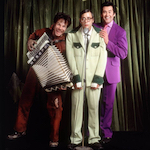 Before I start one of these retrospectives I research the movies that came out during that summer and put together a schedule. But in the course of doing 1991 I keep stumbling across movies that seem worthy of looking at that I missed because they were limited releases, TV movies or DTV and didn’t show up on any of the release date lists I looked at. So when I realized Adam Rifkin’s THE DARK BACKWARD played on one screen starting July 26, 1991 I thought I should backtrack a little to cover it.
Before I start one of these retrospectives I research the movies that came out during that summer and put together a schedule. But in the course of doing 1991 I keep stumbling across movies that seem worthy of looking at that I missed because they were limited releases, TV movies or DTV and didn’t show up on any of the release date lists I looked at. So when I realized Adam Rifkin’s THE DARK BACKWARD played on one screen starting July 26, 1991 I thought I should backtrack a little to cover it.
 For those not familiar with it, it’s a forcefully weird and uncomfortable comedy that was a favorite of mine in the ‘90s, one of those movies I rented on VHS and made a dub of to show to people who had never heard of it, which was most people. It was Rifkin’s first script ever, written at age 19 after moving to L.A. to try to become a director, made when he was in his mid 20s, and it’s a sense of humor and world view that admittedly appealed to me more when I was closer to that age. But it’s such a distinct and unadulterated vision I can’t help but still kinda love it.
For those not familiar with it, it’s a forcefully weird and uncomfortable comedy that was a favorite of mine in the ‘90s, one of those movies I rented on VHS and made a dub of to show to people who had never heard of it, which was most people. It was Rifkin’s first script ever, written at age 19 after moving to L.A. to try to become a director, made when he was in his mid 20s, and it’s a sense of humor and world view that admittedly appealed to me more when I was closer to that age. But it’s such a distinct and unadulterated vision I can’t help but still kinda love it.
The plot is a silly riff on a show biz story: Marty Malt (Judd Nelson right after NEW JACK CITY, previously in Rifkin’s NEVER ON TUESDAY) dreams of being a stand up comedian. He gets a gig at a bar, but he’s absolutely terrible at it, a sweaty mess with cryptic jokes and atrocious delivery. His career doesn’t seem to be going anywhere, even if his best friend/co-worker Gus (Bill Paxton between PREDATOR 2 and ONE FALSE MOVE) swears “I was laughin… on the inside!”
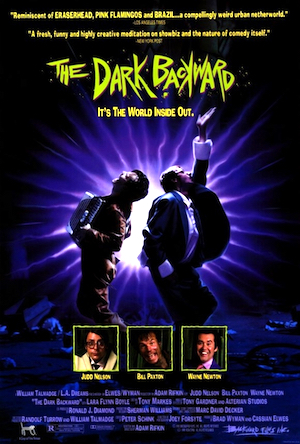 Then one day Marty notices a large bump on his back, which grows into a baby-sized hand, and then an adult-sized arm (courtesy of Tony Gardner and Alterian Studios). So Gus drags him to the office of Jackie Chrome (Wayne Newton, THE ADVENTURES OF FORD FAIRLANE, in a purple suit with a crooked, painted-on mustache), a talent agent who recently rejected him. Before you know it Marty has been renamed “Desi the Three-Armed Wonder Comic,” and he tells the same jokes but then does a little spin to show everyone his third arm while Gus plays the Popeye song on his accordian. This act doesn’t seem to go over much better than the other one, but it captures the eye of Dirk Delta (Rob Lowe, BAD INFLUENCE, with a fake nose), a big deal talk show booker “from Hollywood, California.” So of course now that the arm is getting Marty his shot (SPOILER) he wakes up one morning and it’s gone.
Then one day Marty notices a large bump on his back, which grows into a baby-sized hand, and then an adult-sized arm (courtesy of Tony Gardner and Alterian Studios). So Gus drags him to the office of Jackie Chrome (Wayne Newton, THE ADVENTURES OF FORD FAIRLANE, in a purple suit with a crooked, painted-on mustache), a talent agent who recently rejected him. Before you know it Marty has been renamed “Desi the Three-Armed Wonder Comic,” and he tells the same jokes but then does a little spin to show everyone his third arm while Gus plays the Popeye song on his accordian. This act doesn’t seem to go over much better than the other one, but it captures the eye of Dirk Delta (Rob Lowe, BAD INFLUENCE, with a fake nose), a big deal talk show booker “from Hollywood, California.” So of course now that the arm is getting Marty his shot (SPOILER) he wakes up one morning and it’s gone.
“How could you do this to me!?” Gus yells at him.
The main thing that makes this ridiculous story special – and probly unwatchable for some – is the depressingly squalid world it takes place in. The critics who didn’t hate THE DARK BACKWARD (like the one quoted on the VHS cover) compared it to David Lynch, John Waters and Terry Gilliam. Waters is the closer match tonally – it’s aggressively gross and has a side show feel to many of its characters – but I get why you’d bring up the other two, because there’s just such a meticulousness in the design of all this bleakness and filth.
Absolutely everything in this nameless city is dirty. Walls are stained, windows and mirrors are smeared and cracked, streets are strewn with litter.
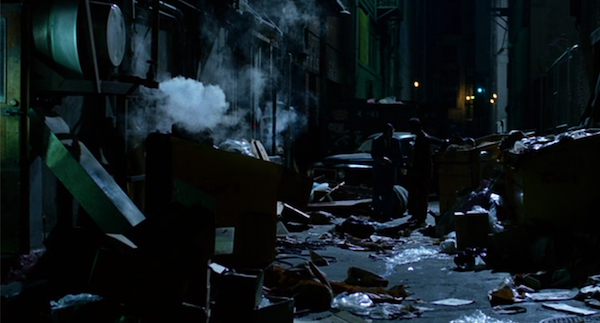
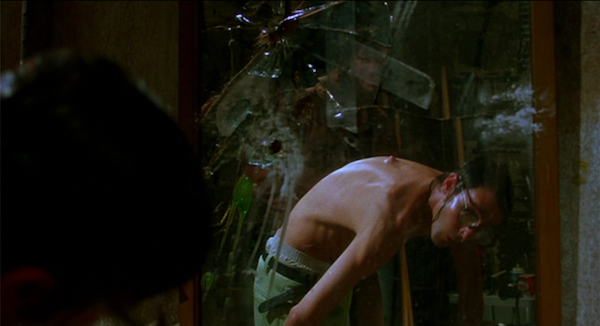
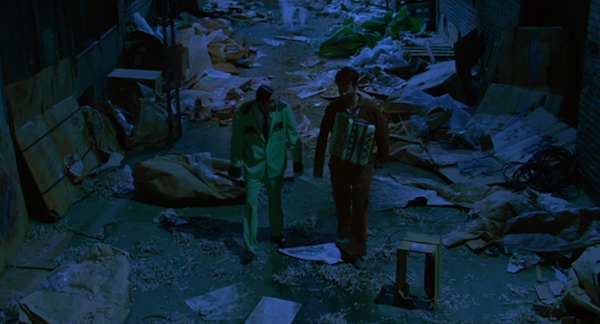
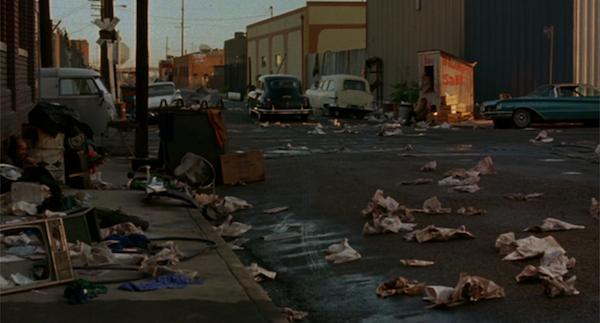
When Marty goes to see Doctor Scurvy (James Caan in his unlikely followup to MISERY) about his bump, there are rats and bloody gloves in the office and the doctor cleans his scalpels by running them under the sink and wiping them on his jacket. (He ends up charging Marty $250 for poking at the thing, putting a Band-Aid on it and telling him “Do anything you want, you little weasel. I don’t care. I don’t. Care.”)
Marty and Gus work as garbagemen, which must be a common trade here – garbage seems to be the #1 export. They’re either terrible at the job or it’s just not possible to do in this world – there’s a scene where they’re going down a street throwing garbage into their truck, and don’t seem to notice that none of it stays in the back, or that the whole street is covered with stuff they don’t even bother with.
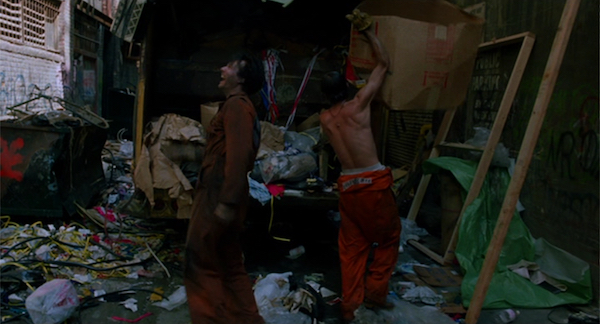
As if that doesn’t make life shitty enough, it’s a world where everything from the beef to the coffee to the cigarettes to the garbage trucks to the “squeezable bacon” and “Cheddar-scented cheese” are made by some company called Blump’s, whose phonily smiling mascot (a photo of Rifkin’s grandmother) seems to watch over you from billboards and mustard bottles, an eerie Big Brother representing that ‘80s (and I guess early ‘90s) obsession with subverting wholesome 1950s imagery.
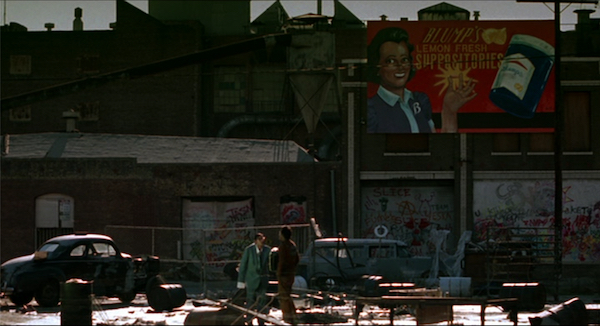
It should be noted that the whole movie is scored with carnival/circus style music by Marc David Decker (PRINCESS WARRIOR), and listening on headphones I realized that there’s a quiet whistling wind sound (or something) at most times. In an existence this miserable, it kinda makes sense that you’d need to escape to gloomy, chintzy bars and pursue a dream of some kind of retro Vaudeville type stardom, even if you absolutely suck at it. The only other escape is into watching TV, which seems to only show old timey local kids shows (one of Marty’s career breakthroughs is appearing on “The Twinkee Doodle Show”) and ultra violent Tom & Jerry ripoffs.
Marty is possibly the only innocent in the movie, and he’s constantly manipulated, insulted and degraded by everyone including his supposed best friend Gus, his joyless diner waitress girlfriend Rosarita (Lara Flynn Boyle, whose MOBSTERS was released the same day), his bed-ridden mother (Anna Berger, also in MOBSTERS) and bar owner Syd (Danny Dayton, “Dirty Bum at Party,” LIFE STINKS), with absolutely no ability to stand up to any of them. Everything, no matter how obviously not his fault, is said to be his fault: when he shows his mom the arm she says, “You think you bring up a kid right, and what does he do? He pulls a stunt like this!” And he doesn’t have much of a rebuttal.
It’s a truly spectacular performance by Nelson, who had to fight for the role after Rifkin initially rejected him, thinking of him as a jock. He’s barely recognizable with his skinny, hunched over frame, thick glasses, greasy hair and timid monotone. Though the character is very different, I’ve always assumed he had to have been an inspiration for Neil Hamburger. There’s a weird mix of hilarity and frustration as you watch Marty awkwardly stammer his non-sequitur jokes to rooms of silently disapproving drinkers, or repeatedly get metaphorically stomped on and then walk away sadly in defeat. For choice early cringe humor check out the scene where Gus pressures Marty to tell Rosarita “the one about the podiatrist,” so he starts to, but she throws off his timing by asking “What’s a podiatrist?,” and Gus laughs “Who the hell knows!,” and he tries to keep going but Gus stops him to interject something and doesn’t seem to notice he never lets him finish.
That’s pretty representative of Marty’s whole life.
Gus doesn’t seem to realize he’s despicable. He tries to be encouraging to Marty, but only by giving him false hope for his comedy, and then betrays him in all the worst ways possible. And he’s proud to be repulsive. He scarfs down a mushy plate of chicken rotting in Marty’s refrigerator, and brags about eating dog food with minced clams for breakfast. There’s an outrageous scene about 12 minutes in where he discovers a naked corpse buried in the dump. The score has a dark synth sting like this is the turning point where it will turn into a murder mystery or something. Instead, Gus looks around to make sure no one is looking, licks the dead woman’s nipples, then covers her up when Marty calls for him. And it’s never mentioned again. On the DVD extras Paxton calls that scene “the line of demarcation” when people walk out of the movie or are officially on board for anything.
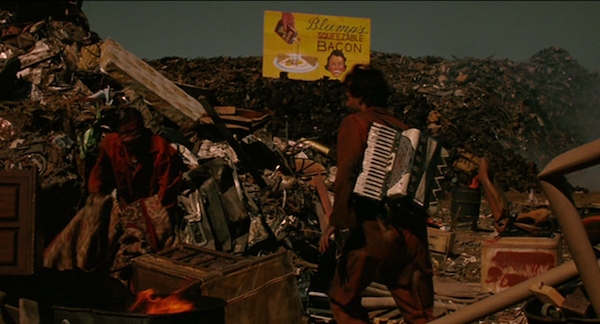
(But there’s actually one scene I’m not on board for. After Rosarita dumps Marty for having a third arm – “People don’t grow hands out of their backs, what’s wrong with you!?” “Well I… I didn’t grow one on purpose.” – Gus says he’ll go have a talk with her about it, and instead accosts her behind the counter at the diner. Her repeated “No”s give way to passionately going at it with him. I hate that trope [seen often in the ‘70s, especially in Japanese films, as well as in CRANK] of the “it seems like rape for a while but then she starts liking it so it turns out in retrospect it was consensual.”)
If you can swallow all this scumminess without dry heaving, it’s honestly one of Paxton’s best performances, and in my opinion his funniest. On the DVD extras he compares the Marty/Gus relationship to MIDNIGHT COWBOY, and says he studied Michael Keaton in NIGHT SHIFT for his performance. He kinda reminds me of Chris Farley’s Matt Foley combined with a little bit of Bill Moseley’s Chop Top.
And you gotta hand it to Newton too. He’s also playing an amoral scumbag, and he goes for it. Apparently he was offered a cameo, but he read the script three times, decided he liked it, and asked if instead he could play the central role of Jackie. He says it’s one of the projects he’s most proud of! (Sorry, VEGAS VACATION.) I think maybe my favorite scene for the three of them bouncing off each other is in the third act when Marty and Gus sit uncomfortably listening only to Jackie’s side of a phone conversation nervously explaining to the talk show producers that Desi the Three-Armed Wonder Comic is down to only two arms. One of those fateful moments that will make or break a career.
There are other name actors showing up here and there, not always recognizable. I did spot Tony Cox (BAD SANTA) as one of the members of Jackie’s new act “Marjorie Zipp and Her Human Xylophone,” but I only now realized it was Rifkin’s NEVER ON TUESDAY and TALE OF TWO SISTERS star Claudia Christian playing the nurse who hits on Marty. And I never noticed until it was pointed out in the commentary that Billy Bob Thornton (years before starring with Cox in BAD SANTA and Paxton in A SIMPLE PLAN) is in the crowd when Marty performs at Sloppy’s. He had also been in GOING OVERBOARD, which Rifkin did some uncredited writing on.
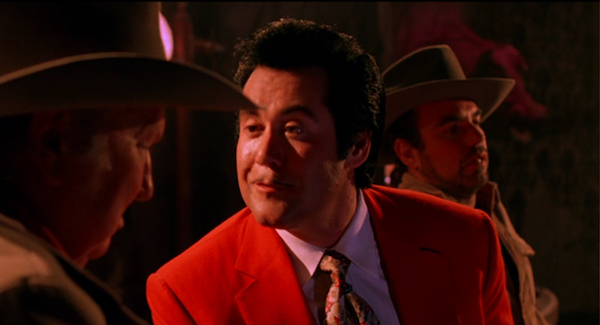
Also according to the commentary the hand turning the pages on the storybook opening credits is David Silverman, a Simpsons director since the beginning (including the introduction!) and later MONSTERS, INC. co-director. He’s also credited for making up the name “Blump’s.”
Back when I used to watch this over and over I wouldn’t have minded – and might’ve liked – a nihilistic ending where everything gets even worse for everybody. But these days I appreciate the little bit of progress at the end when SPOILER Marty is back performing at Syd’s after a shift on the garbage truck, and he decides to just talk about what happened with him, growing a third arm and all that. And the crowd actually listens, and laughs, and he gets into a groove. It’s the first time when both he and the audience seem to be enjoying themselves. I don’t really buy that they’re laughing at this, but it’s a nice idea that he’s able to turn his life into art. On the extras Paxton calls it “the catharsis of hope,” and Rifkin says it’s about “finding humor out of tragedy.” Although he had originally scripted the fuck-you ending. 19 year olds will do that. Or did back then, at least.
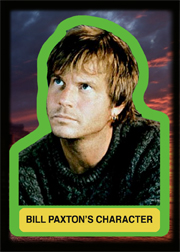 Although Rifkin describes the budget as “well under a million dollars,” Wikipedia characterizes it as performing “extremely poorly during its limited run, making only $28,654.” But Box Office Mojo said it only played on one screen – for 22 weeks. It opened at the Angelika Film Center in New York, and I imagine the print moved around after that. The real question is whether it made money with the VHS and laserdisc (and later DVD), which I suspect it did. Still, Paxton (who was clearly very proud of the movie) jokes on the extras about it damaging his career. Maybe if he hadn’t done it he would’ve had the Leo role in TITANIC instead of the Paxton one.
Although Rifkin describes the budget as “well under a million dollars,” Wikipedia characterizes it as performing “extremely poorly during its limited run, making only $28,654.” But Box Office Mojo said it only played on one screen – for 22 weeks. It opened at the Angelika Film Center in New York, and I imagine the print moved around after that. The real question is whether it made money with the VHS and laserdisc (and later DVD), which I suspect it did. Still, Paxton (who was clearly very proud of the movie) jokes on the extras about it damaging his career. Maybe if he hadn’t done it he would’ve had the Leo role in TITANIC instead of the Paxton one.
In the New York Times, Janet Maslin wrote that Rifkin “concentrates only on stomach-turning trivia and on the kind of exaggeratedly stupid behavior that amounts to directorial condescension,” with “a story idea that is barely solid enough to sustain a brief skit.” In Rolling Stone, Peter Travers called the movie “a new low in cinematic ineptitude.” Negative reviews were not confined to the time of release. Most of the quotes on Rotten Tomatoes are dated from the early 2000s, and include “Tries way too hard to be a cult classic, which probably explains why it’s not one,” (Scott Weinberg, eFilmCritic.com), “Really strange. Really bad,” (Ken Hanke, Mountain Xpress) and “One word: crap,” (Mike McGranaghan, Aisle Seat). But Spence D. of IGN Movies scored it 3 out of 5, saying, “Quote not available.”
Back in that ’91 review, Maslin admitted, “Mr. Rifkin’s direction does display, in addition to an appreciation of Mr. Lynch and perhaps John Waters, a promising eye for design and a taste for the unusual. With less noxious material and a less patronizing manner, those talents would amount to a lot more.” But Rifkin’s directorial work has never really returned to that sort of visual style. His followups were THE NUTT HOUSE (1992) and PSYCHO COP RETURNS (1993) before the more mainstream THE CHASE (1994) starring Charlie Sheen and Kristy Swanson. I think his best known film is DETROIT ROCK CITY (1999), and I’m a big proponent of his love letter to Burt Reynolds, THE LAST MOVIE STAR (2017). One reason he’s been able to keep making indie movies is that he had a much bigger career as a screenwriter, with some of his never-made movies including a remake of PLANET OF THE APES (before James Cameron tried) and a MASTERS OF THE UNIVERSE movie, but he also has credits on actually-produced studio movies like Gore Verbinski’s MOUSEHUNT, Joe Dante’s SMALL SOLDIERS, ZOOM (from BILL & TED’S BOGUS JOURNEY director Peter Hewitt), UNDERDOG and KNUCKLEHEAD (the comedy from the prestigious WWE Studios). Also his movie LOOK was turned into a Showtime series.
So he gets around. But to me he’s still the DARK BACKWARD guy.


























August 2nd, 2021 at 9:45 am
It there’s one good thing about the delicate cultural sensibilities (don’t want to invoke any of those buzz words) of the modern era, it’s that I no longer have to pretend to have any respect for the fucking CRANK movies.
Yes, that is definitely the best thing.